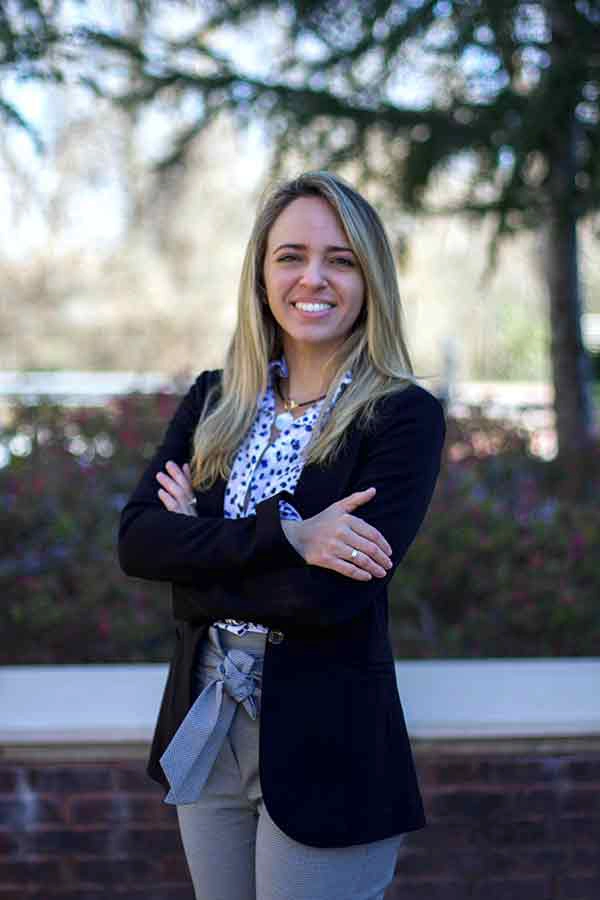Predicting antibiotic resistance using whole genome sequencing
Meet Victoria Cabán Figueroa
Victoria Cabán Figueroa was born and raised in San Juan, Puerto Rico. Growing up on a Caribbean island meant she was almost constantly immersed in nature, which cultivated a strong appreciation for science and the natural world. Exploration, observation and endless questions were common fixtures of her activities as a youth.

As a fellow at the Centers for Disease Control and Prevention, Victoria Cabán Figueroa used whole genome sequencing to predict antibiotic resistance of sexually transmitted diseases.
In middle school, Cabán Figueroa was hospitalized after contracting dengue fever, a mosquito-borne viral disease. Her illness sparked her initial curiosity about the field of microbiology.
“Contrary to my parents’ sentiment, I was fascinated when the doctor went into details about the disease during my daily checkup at the hospital,” she said. “I remember asking him about the technicalities about the transmission, what a virus was, why my joints were hurting, why my body’s temperature was increasingly high and so on.”
After her successful recovery, Cabán Figueroa’s newfound interest in diseases and microbiology persisted. She pursued a bachelor’s degree in industrial microbiology at the University of Puerto Rico, Mayagüez in 2017, followed by a master’s degree in bioinformatics at the Georgia Institute of Technology in 2019. During her last semester at Georgia Tech, she spotted a flyer promoting an Oak Ridge Institute for Science and Education (ORISE) fellowship at the Centers for Disease Control and Prevention (CDC).
The ORISE fellowship is one of many CDC Research Participation Programs, which are educational and training programs designed to provide students, recent graduates and university faculty opportunities to participate in project-specific CDC research, current public health research and developmental activities. Having admired the work performed by CDC throughout her educational career, Cabán Figueroa was eager to participate in the program. She applied and was accepted in 2019.
For her appointment, Cabán Figueroa was placed in the Gonorrhea Resistance Markers Unit at the Laboratory Reference and Research Branch (LRRB) in the Division of Sexually Transmitted Disease Prevention (DSTDP). DSTDP is a division of the National Center for HIV/AIDS, Viral Hepatitis, STD and TB Prevention (NCHHSTP). Under the mentorship of Matthew Schmerer, Ph.D., she contributed to projects and research studying Neisseria gonorrhoeae, the causative agent of gonorrhea. The disease infects about 78 million individuals globally.
Over time, Neisseria gonorrhoeae has developed some type of resistance to nearly all of the antibiotics routinely prescribed, making it difficult to successfully treat some types of gonorrhea infections. The causes of the spread of antibiotic resistance are complex, as are the strategies to combat this threat. CDC monitors antibiotic resistance trends, and as part of DSTDP, LRRB performs research on the pathogenesis and genetics of sexually transmitted diseases (STDs) including gonorrhea.
Cabán Figueroa’s research focused on developing computational tools tailored to understand and predict the levels of antibiotic resistance in Neisseria gonorrhoeae. She examined Neisseria gonorrhoeae genes using whole genome sequencing, which is the process of determining the complete DNA sequence of a given organism. She looked for the contributions of commonly recognized molecular antimicrobial resistant determinants, or the bacterial genes responsible for antibiotic resistance. The goal of Cabán Figueroa’s research was to predict antibiotic minimum inhibitory concentrations of Neisseria gonorrhoeae, which could help identify treatment options for those infected. Her efforts helped support DSTDP’s objectives of refining current methodologies and developing new strategies in order to maximize the use of the whole genome sequencing data.
Through her fellowship, Cabán Figueroa had the opportunity to learn from expert public health scientists. She developed new skills and strengthened her understanding of bioinformatics. The experience increased her confidence as a scientist and opened doors for her career.
“I would definitely recommend this program to young professionals who are looking to build a career in research,” Cabán Figueroa said. “This is a great educational experience for those interested in stepping into the federal workforce. It allows them to network, gain experience and grow as young professionals and as scientists or engineers.”
After her fellowship, Cabán Figueroa plans to continue her graduate studies with the goal of mentoring young scientists and students. She aspires to one day contribute to the establishment and advancement of a scientific infrastructure in Puerto Rico.
The program is managed by the Oak Ridge Institute for Science and Education (ORISE) under an agreement between the Centers for Disease Control and Prevention (CDC) and the U.S. Department of Energy (DOE). ORISE focuses on scientific initiatives including educating the next generation of scientists and is managed for DOE by ORAU.

